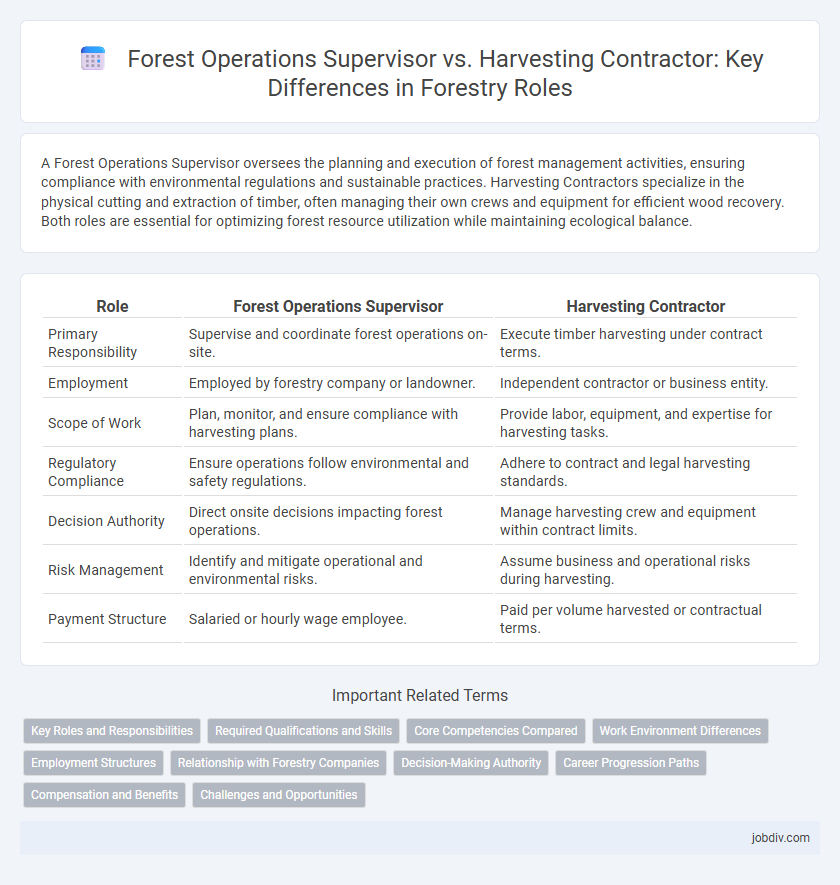A Forest Operations Supervisor oversees the planning and execution of forest management activities, ensuring compliance with environmental regulations and sustainable practices. Harvesting Contractors specialize in the physical cutting and extraction of timber, often managing their own crews and equipment for efficient wood recovery. Both roles are essential for optimizing forest resource utilization while maintaining ecological balance.
Table of Comparison
| Role | Forest Operations Supervisor | Harvesting Contractor |
|---|---|---|
| Primary Responsibility | Supervise and coordinate forest operations on-site. | Execute timber harvesting under contract terms. |
| Employment | Employed by forestry company or landowner. | Independent contractor or business entity. |
| Scope of Work | Plan, monitor, and ensure compliance with harvesting plans. | Provide labor, equipment, and expertise for harvesting tasks. |
| Regulatory Compliance | Ensure operations follow environmental and safety regulations. | Adhere to contract and legal harvesting standards. |
| Decision Authority | Direct onsite decisions impacting forest operations. | Manage harvesting crew and equipment within contract limits. |
| Risk Management | Identify and mitigate operational and environmental risks. | Assume business and operational risks during harvesting. |
| Payment Structure | Salaried or hourly wage employee. | Paid per volume harvested or contractual terms. |
Key Roles and Responsibilities
A Forest Operations Supervisor oversees planning, coordinating, and monitoring timber harvesting activities to ensure safety, regulatory compliance, and efficient resource management. Harvesting Contractors execute the physical cutting, extraction, and transportation of timber, adhering to operational plans and environmental guidelines. Both roles require strong knowledge of forestry practices, but the supervisor emphasizes strategic oversight, while the contractor focuses on on-the-ground execution.
Required Qualifications and Skills
A Forest Operations Supervisor requires formal education in forestry or natural resource management, along with leadership skills and knowledge of environmental regulations to oversee sustainable harvesting practices. Harvesting Contractors must demonstrate practical experience in logging techniques, equipment operation, and safety compliance, with strong mechanical skills and the ability to manage seasonal workforce effectively. Both roles demand excellent communication and problem-solving abilities, but the supervisor emphasizes strategic planning while the contractor focuses on operational execution.
Core Competencies Compared
Forest Operations Supervisors demonstrate expertise in planning, safety management, and workforce coordination, ensuring efficient and compliant timber harvesting processes. Harvesting Contractors specialize in operational execution, equipment handling, and resource optimization, focusing on maximizing yield and cost-effectiveness on the ground. The supervisor's core competencies emphasize leadership and strategic oversight, while contractors excel in technical skills and practical implementation within forestry operations.
Work Environment Differences
Forest Operations Supervisors typically work within the planning and management hubs, coordinating activities from offices or in the field to ensure compliance with safety and environmental regulations. Harvesting Contractors operate primarily on-site, managing crews and machinery directly in forest stands, often in remote and physically demanding conditions. These distinct work environments influence their daily tasks, with supervisors emphasizing strategic oversight and contractors focusing on hands-on execution.
Employment Structures
Forest Operations Supervisors are typically employed directly by forestry companies or government agencies, providing oversight and coordination of logging activities with a salaried or hourly wage structure. Harvesting Contractors operate as independent business entities or subcontractors, managing their own crews and equipment, often compensated based on volume of timber harvested or contract terms. Employment structures differ significantly, with supervisors engaged in stable employment and contractors assuming greater financial risk and operational autonomy.
Relationship with Forestry Companies
A Forest Operations Supervisor typically maintains direct oversight and coordination with forestry companies, ensuring compliance with silvicultural plans and operational standards. Harvesting Contractors work as external service providers, engaging with forestry companies through contractual agreements focused on timber extraction efficiency and cost-effectiveness. The relationship between forestry companies and these roles hinges on communication, accountability, and execution of sustainable harvesting objectives.
Decision-Making Authority
The Forest Operations Supervisor holds significant decision-making authority in planning, coordinating, and overseeing on-site forestry activities to ensure compliance with environmental regulations and operational goals. Harvesting Contractors execute specific logging tasks based on the supervisor's directives but have limited authority in strategic decisions or operational adjustments. Clear delineation of decision-making roles enhances efficiency and accountability within forest management projects.
Career Progression Paths
Forest Operations Supervisors typically advance through roles involving team leadership, project management, and regulatory compliance, often requiring certifications in forestry management and safety protocols. Harvesting Contractors frequently progress by expanding their equipment fleet, enhancing operational efficiency, and securing larger contracts, with expertise in timber harvesting techniques and logistics driving success. Career progression for both paths involves acquiring specialized knowledge in sustainable forestry practices and industry regulations that influence operational decisions.
Compensation and Benefits
Forest Operations Supervisors typically receive a stable salary with benefits such as health insurance, retirement plans, and paid leave, reflecting their managerial responsibilities and consistent work schedules. Harvesting Contractors usually operate as independent business owners, earning income based on contracts and volume of timber harvested, often without employer-provided benefits, requiring them to manage their own insurance and retirement planning. Compensation for supervisors tends to provide long-term financial security, while contractors benefit from potentially higher earnings tied directly to productivity but face greater income variability and personal responsibility for benefits management.
Challenges and Opportunities
Forest Operations Supervisors face challenges in coordinating complex logistics, ensuring compliance with environmental regulations, and managing workforce safety, but gain opportunities to optimize resource use and implement sustainable practices. Harvesting Contractors encounter difficulties in equipment maintenance, fluctuating market demands, and terrain variability, while benefiting from flexible project selection and technology adoption to increase efficiency. Both roles demand adaptive strategies to balance productivity with conservation goals in dynamic forest environments.
Forest Operations Supervisor vs Harvesting Contractor Infographic

 jobdiv.com
jobdiv.com